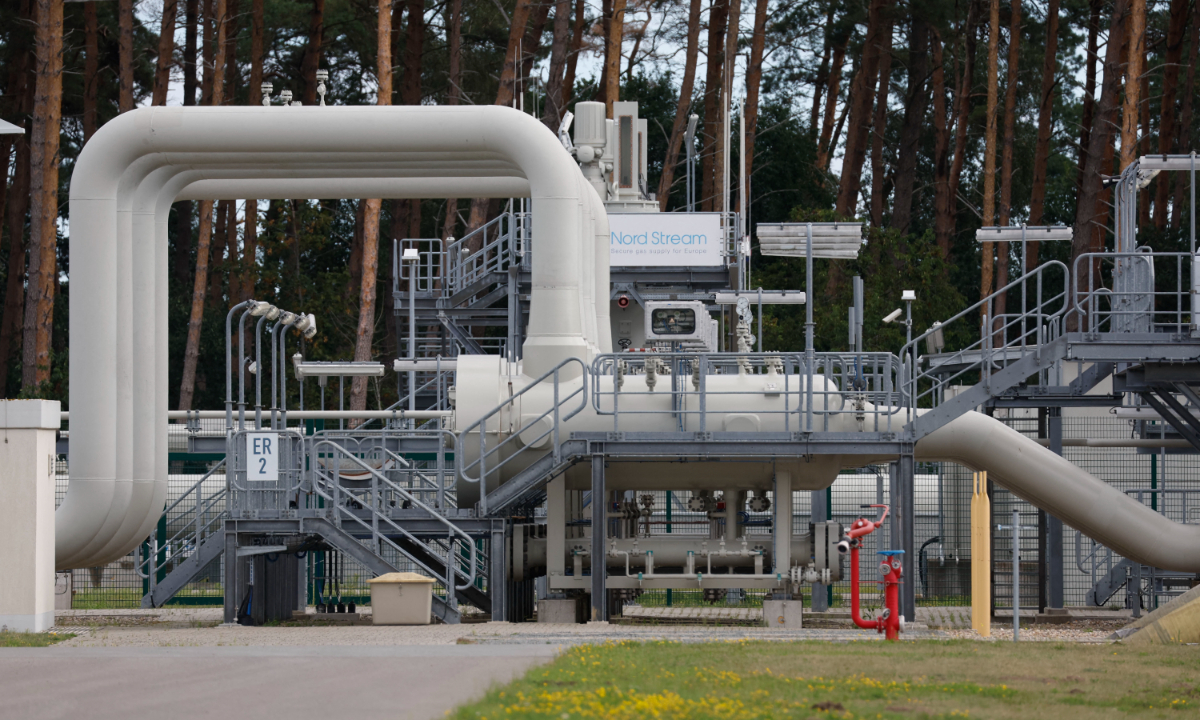
Photo: AFP
Amid fears of an indefinite cutoff of Russian gas flows through the Nord Stream 1 pipeline, the EU will have to ramp up imports of liquefied natural gas (LNG) from alternative supplies in the run-up to the coming winter, making the US conspicuously the biggest winner in the Russia-Ukraine crisis, experts said on Saturday.
At the meantime, a shift in European demand from Russian pipeline gas to LNG has already led to a surge in orders for LNG carriers, leading to a record number of orders being placed this year.
Russian state energy giant Gazprom said on Friday evening that due to equipment problems, the supply of Russian gas to Germany through the Nord Stream 1 pipeline would not be resumed as planned, fueling worries of a worsening energy crisis in Europe and around world.
After the completion of the three-day maintenance work, gas was originally supposed to begin flowing through the Nord Stream 1 pipeline again on Saturday morning. The pipeline is a key artery carrying Russian gas supplies to Europe, accounting for about 35 percent of Europe's total Russian gas imports in 2021, according to CNN.
However, after an oil leak was detected at its Portovaya compressor station, Gazprom said that the pipeline must be shut down "until all equipment faults have been rectified." It was not specified how long this would take.
The news came on the same day when EU Commission chief Ursula von der Leyen said Europe needs to impose a price cap on Russian pipeline gas and the Group of Seven finance ministers agreed to impose a price cap on Russian oil in a bid to curb Moscow's revenue from oil sales while taming unchecked inflation.
In response, Dmitry Medvedev, deputy chairman of the Russian Security Council, wrote on the Telegram messaging app, "There will simply be no Russian gas in Europe."
Since June, Gazprom has slashed flows through Nord Stream 1 to 20 percent of its capacity, blaming sanctions imposed by the West for disrupting routine operations and maintenance of the pipeline.
At a time when Russian pipeline gas supplies have been in free fall, the EU had no choice but to ramp up imports from the US at all costs, generating unprecedented profits for US gas suppliers, Lin Boqiang, director of the China Center for Energy Economics Research at Xiamen University, told the Global Times on Saturday.
Through to June of this year, the US exported about 57 billion cubic meters (bcm) of LNG with 39 bcm, or 68 percent, going to Europe, according to Refinitiv data. That is compared with 34 bcm, or 35 percent, of LNG exports shipped to Europe during 2021 when the US LNG exports totaled around 97 bcm, according to Reuters.
"This would have been unthinkable in the past in that US LNG prices are clearly much higher than Russian pipeline gas prices because of the transport costs, but now the Ukraine crisis has made it real with the EU determined to reduce its energy dependence on Russian gas," Lin noted. "In other words, the world's energy landscape is undergoing a huge restructuring due to geopolitical factors, accompanied by soaring prices and supply shortages."
Energy prices will remain high until the restructuring is completed, putting more pressure on the world economic recovery, noted Lin.
"As it turns out, the US has gained the most from the energy crisis by opening up a huge market for American gas suppliers, tightening its grip on Europe and hurting Russia's key export," A Beijing-based expert on international affairs who spoke on condition of anonymity told the Global Times on Saturday.
The US created the Ukraine crisis in the first place, but has now become the biggest winner sitting across the ocean and profiting from the crisis. This calls for reflection and vigilance, Zhao Lijian, spokesperson of China's Foreign Ministry, said on Friday.
Zhao said that he is aware of reports that the gap between gas prices in the European and US markets is now as much as 10 times, a record high.
The remarks came in response to comments by some in the European media who have said that the US is masquerading as a savior while banking huge profits by selling gas to European countries, with the latter facing energy shortages due to sanctions targeting Russia that forced them to buy US natural gas at high prices.
According to data published by Business Insider, an American financial and business news website, US companies are making more than $100 million per container ship of LNG bound for Europe.
"Even with the expensive LNG imports from the US, it may still be hard for the EU to avoid facing soaring inflation, power shortages, and production disruptions in the upcoming winter, when energy demand usually picks up sharply," Lin said.
"The EU needs more time to get itself prepared for reducing its dependence on Russian gas, which includes but not limited to more LNG ships and more gas storage facilities," the Beijing-based expert said.
Global LNG traders have placed a remarkable number of orders for LNG ships, with Chinese and South Korean shipyards received record number of orders.
For instance, Shanghai-based Hudong-Zhonghua Shipbuilding Co this year received LNG ship orders equivalent to the number of the past 20 years combined, an expert at Hudong-Zhonghua, who requested anonymity, told the Global Times on Saturday.
"Even if there are enough LNG carriers, the EU may still lack enough receiving and storage terminals, which may take years to build," he noted. "To save construction time, Germany is converting LNG ships into floating storage regasification units for LNG storage, but it will difficult to finish the work by this winter."




